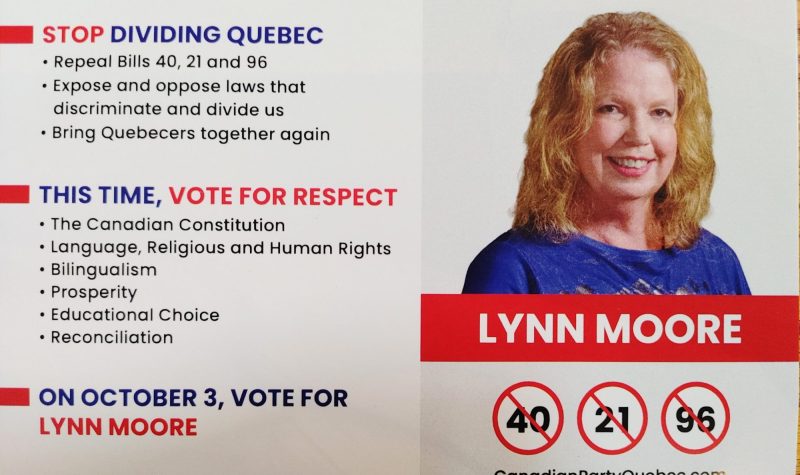The Quebec provincial election is quickly making its way around the corner with voting day taking place on Monday, Oct. 3.
According to the Élections Quebec website, there are ten candidates running in the Brome-Missisquoi region for this year’s election.
These candidates are: Isabelle Charest (Coalition avenir Québec), Pierre Fontaine (Démocratie directe), Sébastien Houle (Indépendant), Alexandre Legault (Québec solidaire), Lynn Moore (Canadian Party of Québec), Caitlin Moynan (Green Party), Guillaume Paquet (Parti québécois), Stéphanie Prévost (Parti conservateur du Québec), Tommy Quirion-Bouchard (Climat Québec), and Claude Vadeboncoeur (Quebec Liberal Party).
For the next week and half, CIDI 99.1 FM is sitting down with candidates who will speak on their political platform and the issues they plan to address in the Brome-Missisquoi riding and at the provincial level.
CIDI had the chance to speak with Lynn Moore, who is running as candidate for the newly formed federalist party Canadian Party of Quebec after discovering that there was no candidate for the Brome-Missisquoi riding.
“I had no intention, the Tuesday morning that I got up, to enter politics. But I was listening to the CBC Radio noon program with Shaun Opell and being interviewed was Colin Standish (party leader) of the Canadian Party of Québec,” recounted Moore. "I found that he spoke to me, that he addressed all of the concerns that I was interested in, and I was so impressed with the man that I started researching on my laptop.”
Moore emphasized that it is of “upmost importance” that the Canadian Party of Québec’s platform consists of respect and freedom of choice.
“Respect for everyone, for Francophones, for Allophones, for Anglophones, for every Quebecer, for new arrivals, to ninth generations like Colin Standish. I think that recent governments have pitted one group against the other in order to stay in power,” she said.
Moore added that the Canadian Party of Québec supports a passenger rail service passing through the Eastern Townships as it travels from Montreal to Boston, the possible development of a commuter train, and the preservation of the Anglo heritage of the Eastern Townships.
“He’s (Standish) pledged to put the Eastern Townships back on the map literally and figuratively. One of the things that the Canadian Party of Québec is proposing is renaming the Estrie region Eastern Townships - Cantons-de-L’Est. (…) There is a heritage going back in the Townships of Anglos, Irish, Scotts, people fleeing the U.S.; we have to get that heritage back here,” explained Moore.
The Canadian Party of Québec also wants to ensure that bilingual services are offered at Brome-Missisquoi Perkins Hospital (BMP Hospital) and the Sherbrooke Hospital with the proposed “Umbrella Clause.”
“The Umbrella Clause is the proposed 'English Language Services Act’ that would guarantee for English-speaking people English language services, for provincial services, for municipal services, and all municipalities could determine the language they choose to function in,” said Moore. “Where, under Bill 96, 15 of 18 bilingual municipalities in the Eastern Townships stand to lose their status.”
Moore’s primary concern is the education system, which she says is “the calling card to a better future,” and bilingualism.
“This does not matter if it’s academic education or trade education, we need both. (…) All of these people should be able to access whatever type education they choose to follow in the language of their choice. Right now, we have a government that would deny access to even Francophones. The CAQ would put a cap on Francophones going to (English) CEGEPS in Quebec,” explained Moore.
At the provincial level, Moore said that the Canadian Party of Québec will call for a complete repeal of Bills 96 (language law), 40 (abolishment of school boards), and 21 (secularism law) as they “hinder Quebec’s progress.”
“On one hand, the provincial government is throwing money into key global industries, such as software development, video game development, and aerospace. It wants these industries to flourish on one hand, yet these industries have a hard time attracting talent from the global pool because key executives coming to Quebec will probably not be allowed to send their children to English schools,” she explained.
Moore added that the Canadian Party of Québec would demand better resources for children with learning difficulties, better school ventilation, develop a bilingual university, and address Quebec’s low literacy rates and high school graduation rates by establishing a province wide symposium.
“These people, given the proper tools, could, for themselves, their families, and for our economy, do so much better. (…) Education is in the provincial sector, we should be addressing this. Not laissez-faire, but pointed legislation, pointed activities, to improve literacy rates and graduation rates,” she emphasized.
On why this year’s election is important, Moore said that “we have reached a tipping point where things have gone beyond sensible, required, necessary, to draconian, oppressive, and repressive.”
“At one time, Francophones were horribly discriminated against, we know this. (…) It’s like the pendulum has swung from one side of injustice to the Francophones, to the other edge of injustice to the Anglophones, the Allophones, the new immigrants,” mentioned Moore.
Listen to the full interview below:


